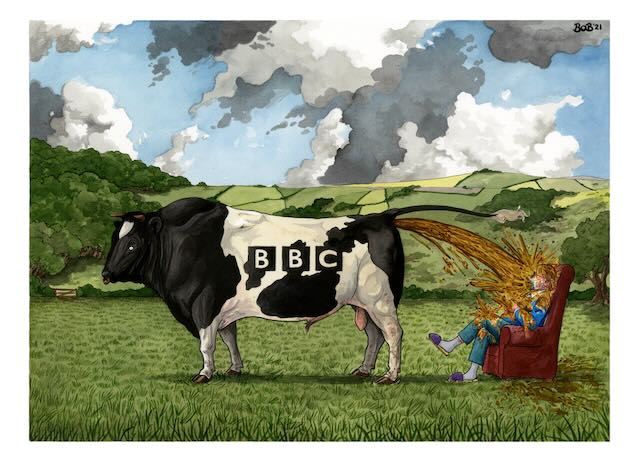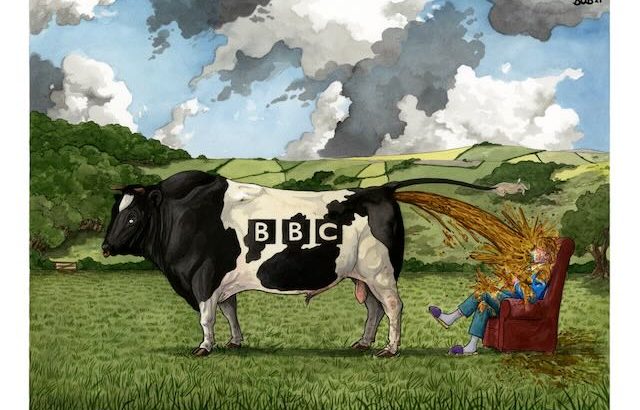
“This is the Biased Broadcasting Corporation and it is not a minute to midnight…”
All HART articles also on Substack. Please consider a PAID SUBSCRIPTION so we can continue our work. Comments are open so you can join in the conversation.
The BBC – the UK’s state broadcaster – has a little-known motto that still adorns the organisation’s coat of arms: “Nation Shall Speak Peace Unto Nation”. There is circumstantial evidence to suggest that this phrase was inspired by a quotation from the Old Testament: “Nation shall not lift up a sword against nation, neither shall they learn war any more” (Micah 4:3).
If only.
We can quibble over the dialect, but the words ring hollow. As one listens to reports of previously unthinkable depravities taking place in various parts of the world, the apothegm ‘triumph of hope over experience’ springs to mind.
The BBC seems to have compounded its issues by managing to alienate almost everyone, be they rational/religious extremists/centrists (delete as appropriate) or just mindless followers of ‘the latest thing’. Leading lights within the organisation seem ‘baffled’ (a common refrain where obvious candidates for causation are deemed politically incorrect) that flagship programmes are haemorrhaging viewers, readers and listeners, seemingly oblivious that going woke is commonly correlated with going broke.
Under fire from all sides, is the BBC a stricken relic of a bygone era, feted by a small band of diehard supporters but fated to be put out of its misery one way or another?
We have previously taken the BBC to task over breathlessly vacuous ‘fact-checks’ that add little to the public discourse, but rather serve merely as an opportunity to shut down what should be legitimate areas of debate by discrediting those that dare go against any chosen narrative du jour. It also seems inexcusable to us that the broadcaster that is funded by the licence fee should align itself so closely to government (getting much wrong in the process); should it not be acting as independently as possible?
How can the organisation point out that Scotland’s winter death toll last year (i.e. 2022-2023) was the worst for 30 years, yet still continue to promote the putrid belief that lockdowns – with all their collateral harms – were justified in 2020? Patrick Vallance, the Chief Scientific Advisor, pointed this out on 16 March 2020: “This is a mild disease in most people” and “epidemics are like a pole vaulter taking flight: the outbreak starts slowly, takes off rapidly, reaches a peak and then comes back down to earth”. Whatever nonsense was being exchanged on politicians’ WhatsApp messages at the time, one thing that was abundantly clear was that the “exponential growth phase was demonstrably over by the third weekend in March, well before the shutters came down”.
But was the BBC reporting this? Were they challenging this departure from common sense; questioning the wisdom of inverting the precautionary principle? Of course not. They were egging the government on, ramping up the fear. This was not just pointed out by sceptics like us, but also by wise old journalistic hands, such as Simon Jenkins, writing in April 2020 in the New Statesman:
The BBC News at Ten has a formula. It opens with a statistic about death. There follows a victim’s family, sobbing and wiping away tears. Then we see a politician with a chart and a slogan. His message is simple, do what I say or more people will die. After that, reason is lost in mush.
Normally it propagates news as delivered by government, and scrutinises it. But when a government has taken emergency powers, the word emergency itself has a censoring impact. Worst case scenarios are invariably headlined. In March, sceptics of the government’s chosen Imperial College-based coronavirus model were vilified. The evening news became a Catholic Mass, with “the science” as the true faith, driving the nation towards the mortification of the flesh. Only the message mattered. Challenge was heresy. To ensure obedience to a one-size-fits-all lockdown, Covid-19 must be presented falsely as an imminent and equal threat to all, hence the prevalence of younger people and frontline staff in photomontages of victims.
… the corporation’s core belief [is] that whatever the issue, government is “not doing enough”. I have never heard a BBC reporter ask why a minister is not doing less”.
There are one or two sane voices within the BBC. The corporation’s health correspondent, Nick Triggle, eschews the worst exaggerations. But he gets the same treatment, enforced by post-edits of his written pieces, as climate realists:
“armies of sycophants can be trusted to hound those who merely report on the weather without anchoring it to a climate scare, and senior sympathisers within the BBC enforce ‘appropriate’ edits and encourage activists to ‘flag similar cases in the future so they can adapt the content accordingly’”.
In truth it is a wonder that the BBC has survived this long. The last thing that the BBC itself would have wanted was to alienate the (growing) sceptical community – albeit currently still a minority – given that there are plentiful mainstream reasons why the corporation is on the skids:
“The current approach… spells swift ruination… Destruction of a brand takes determination, and time. You have to really put in the hours… The figures will keep falling, the threats will keep coming, and nothing dramatic will happen. There will only be more of this lingering, agonising death”.
Symptoms of this morbidity abound, encapsulated by a symptomatic anecdote relating to hugs, which only three years ago were deemed a life-threatening act… but in 2023 an on-duty BBC journalist – of course! – casts impartiality aside while on duty and embraces the leader of a controversial regime. Whether one likes or dislikes said leader is irrelevant — it is fundamentally inappropriate behaviour from what should be a non-partisan state broadcaster.
As the beast weakens, the power it yields diminishes accordingly, even as it attempts to prowl its former territory in a vain attempt to maintain its relevance. Consider this recent apology issued for the excruciatingly out of touch ‘astons’ (infomercials displayed prominently at the bottom of the screen) that BBC Parliament chose to display throughout the Adjournment Debate in the House of Commons while Andrew Bridgen MP was speaking:
“We accept that there was a lack of consistency in our use of these captions and that the number posted during the speech was not proportionate, nor always relevant, which created the incorrect impression that there was an editorial approach in relation to the views expressed. We apologise for this and are reviewing the way we use captions during such proceedings”.
While “Not proportionate, nor always relevant” might not represent a full-blown epitaph, these five words might make a perfect 21st century motto for the BBC. Such idle musing aside, it seems that the Biased Broadcasting Corporation will – one way or another – fade to black.
But we offer a final thought, with a clue in the title of the piece. If Auntie’s problems reside (or at least originate) in the hectoring, one-sided, didactic and patronising nature of its (lack of) discourse, might one not consider an alternative route that turns swords to ploughshares; dialect into dialectics? What worked for ancient philosophers could be a recipe for radical overhaul. The concept of ‘red vs blue’ teams is firmly established in cybersecurity circles, and wise heads such as Gerald Warner and Carl Heneghan have called for this approach to be expanded to both the formation and analysis of policy.
So why not take this a step further? Split the ailing corporation asunder. Create BBC Blue and BBC Red. Decriminalise non-payment of the licence fee and introduce an optional subscription, allowing people to choose one or the other. And let a thousand flowers bloom.
This might not work. But the alternative is Auntie’s lingering, agonising demise.
Can you look her in the eyes and tell her the risk isn’t real?

